UPDATE 2019-01-14: Added some more nutrition and cost information.
Summary
The other day[1], my son and I made a strawberry and banana smoothie (or a whizzy drink, or a protein shake, depending on whom you ask). It occurred to me that I should probably work out what's really in it, so we weighed stuff out, took some pictures and did some sums, all of which I present here. Spoiler alert: There's even a video about cleaning up at the end. If you're struggling to find a protein drink which fits your desired macronutrient profile[2], why not just make your own? It tastes much nicer and is healthier, cheaper and additive free.
NOTE: When speaking of food, we consider three macronutrients: carbohydrate, protein and fat, which are present in varying quantities in all food. You need all three in your diet for optimum health.
The recipe I present here makes a vast drink containing 126g of protein, so you could sensibly split it into two, three or four portions which would look like this (there may be some slight rounding errors, of course):
| Nutrition information per drink if you split it into two | |||
|---|---|---|---|
| Macronutrient | g | kCal | % total kCal |
| Carbohydrate | 46.9 | 188 | 32.9 |
| Protein | 63.1 | 252 | 44.2 |
| Fat | 14.5 | 131 | 22.9 |
| Totals | 570 | 100 | |
| Nutrition information per drink if you split it into three | |||
|---|---|---|---|
| Macronutrient | g | kCal | % total kCal |
| Carbohydrate | 31.3 | 125 | 32.9 |
| Protein | 42.1 | 168 | 44.2 |
| Fat | 9.7 | 89 | 22.9 |
| Totals | 380 | 100 | |
| Nutrition information per drink if you split it into four | |||
|---|---|---|---|
| Macronutrient | g | kCal | % total kCal |
| Carbohydrate | 23.4 | 94 | 32.9 |
| Protein | 31.5 | 126 | 44.2 |
| Fat | 7.2 | 65 | 22.9 |
| Totals | 285 | 100 | |
A brief note about cost
If you buy all the ingredients in the supermarket, this drink costs around £3.43 in raw ingredients (which means it ranges from around 86p per drink upwards, depending on how many portions you make). Bear in mind that it's all real food though; I use this as a meal replacement (e.g. breakfast). Also bear in mind that over half of that cost is the whey isolate and you could use cheaper protein powder. Trust me, if you buy a ready mixed protein shake in a shop, they will have used significantly cheaper ingredients and will also charge you a lot more money (often around £3.50 per serving). I buy everything in bulk, so it costs me a bit less.
Background
Years ago, when I was competing in powerlifting and I didn't have any money, I decided that it might be a good idea to make my own protein drinks, which I did by mixing whey protein, cocoa powder, oats and water (and sometimes olive oil). They weren't very nice. Now that I've got kids and am still in what I'm calling an extended hiatus from competing, I don't do that any more. However, for the last couple of years I've been back training properly and I've been making much nicer protein smoothies. Everyone who has tried them has liked them, so I thought I ought to share one of the recipes. You'll be able to see how you might adapt it to suit your own purposes.
If you want to make your own smoothies, you need some kind of device to blend the ingredients. But you already knew that. I've got a ten-year-old Vitamix, but it works almost as well with something much cheaper.
Method
Before I started, I put the empty Vitamix goblet on the kitchen scales and pressed the tare button[3] to reset the weight to zero.
You should only need to weigh the stuff out once (at most). It's not important to be precise, but it's useful to have a rough idea of how many calories you're consuming.
- Throw in a handful of oats (52g). I had powdered oats lying around, but it's just as good with rolled oats or even oat bran.

- Add three or four scoops of unflavoured whey protein next (110g). I used 97% whey isolate from BulkPowders[*] which claims to be lactose free. The scale reads 162g because I forgot to reset it after adding the oats.
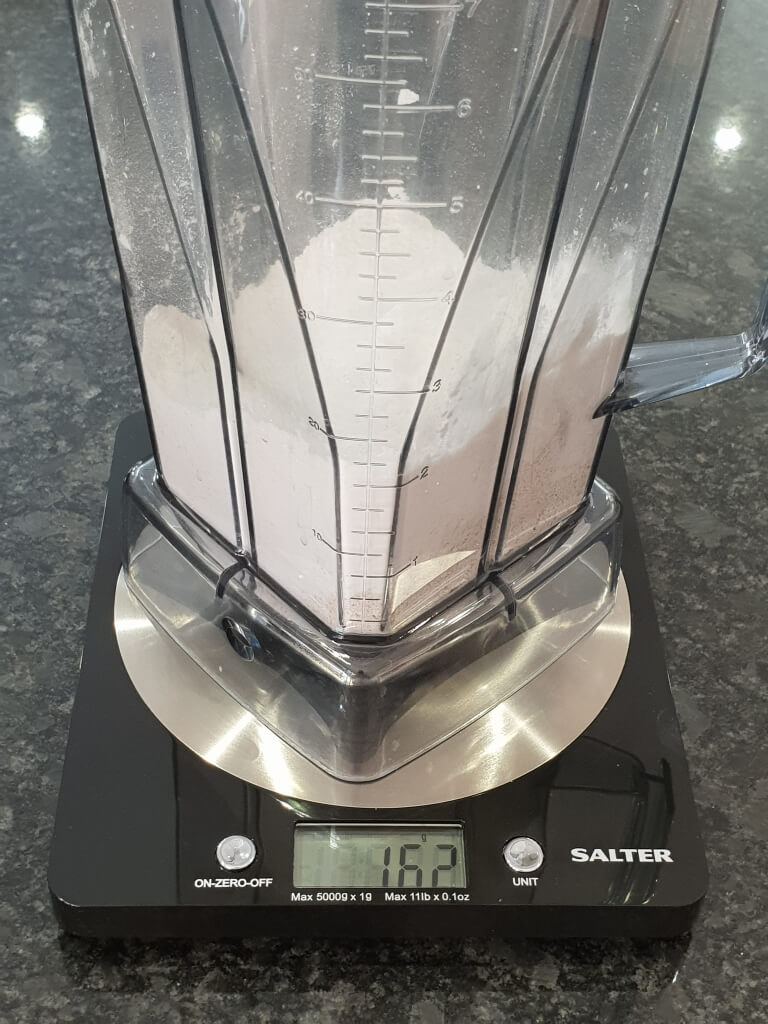
- My son added a massive banana next (130g). Some of the protein powder escaped in a large cloud. Oh well.
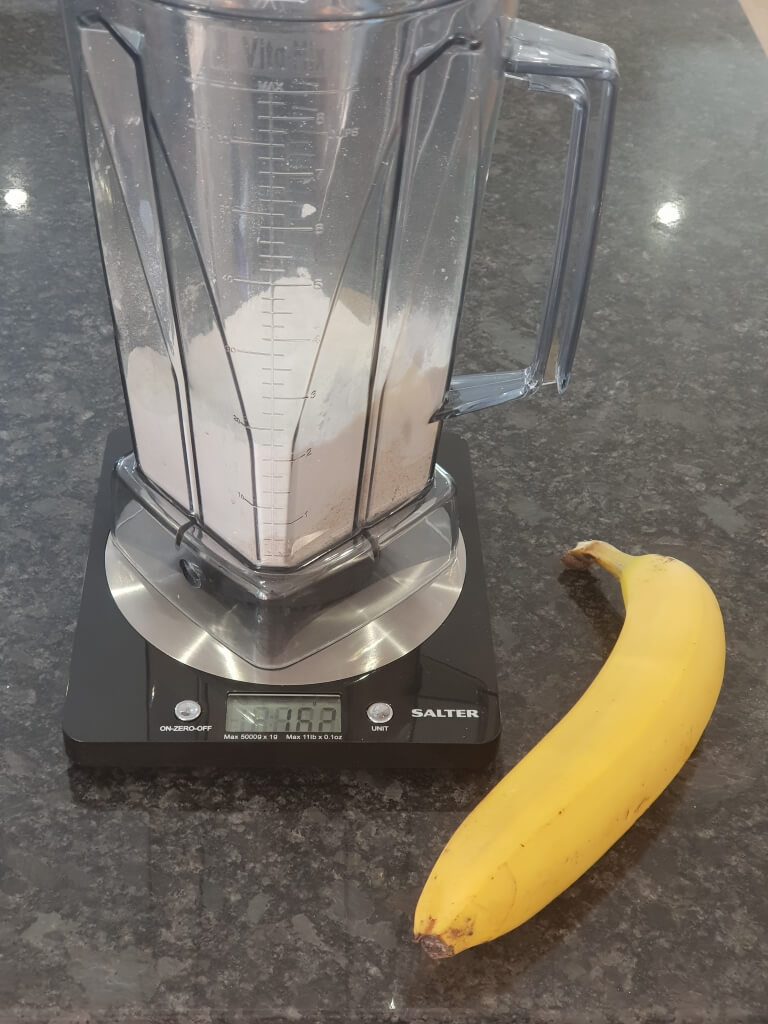

- Frozen grapes (102g). We freeze them to preserve them.
Frozen grapes make a nice snack, but never give a whole grape (frozen or otherwise) to a young child. Seriously, they can choke to death. Read this article from the British Medical Journal and see for yourself. If you've got young kids, you should be supervising them when they're eating but, also, don't give them food that's the perfect size and consistency to block their airways.
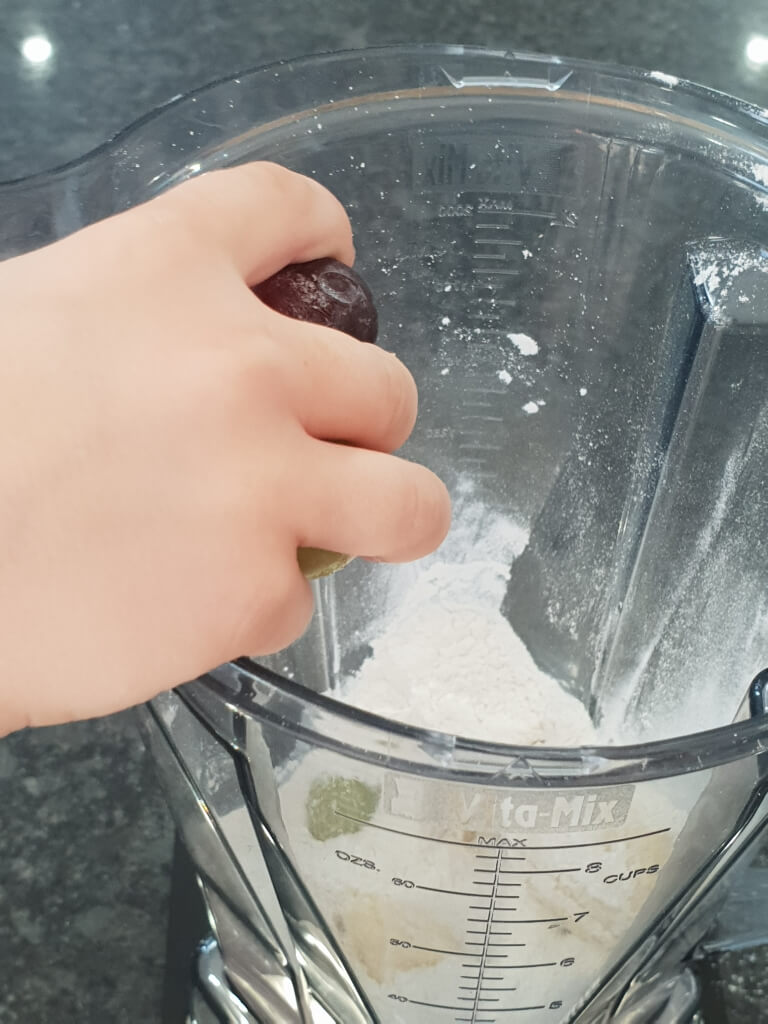

- Handful of Almonds (47g). Don't use these if you have a nut allergy! Nuts have a high fat content and thus contain a lot of calories. Tweaking this ingredient is a simple way to alter the calorific content significantly.

- Frozen fruit (149g).
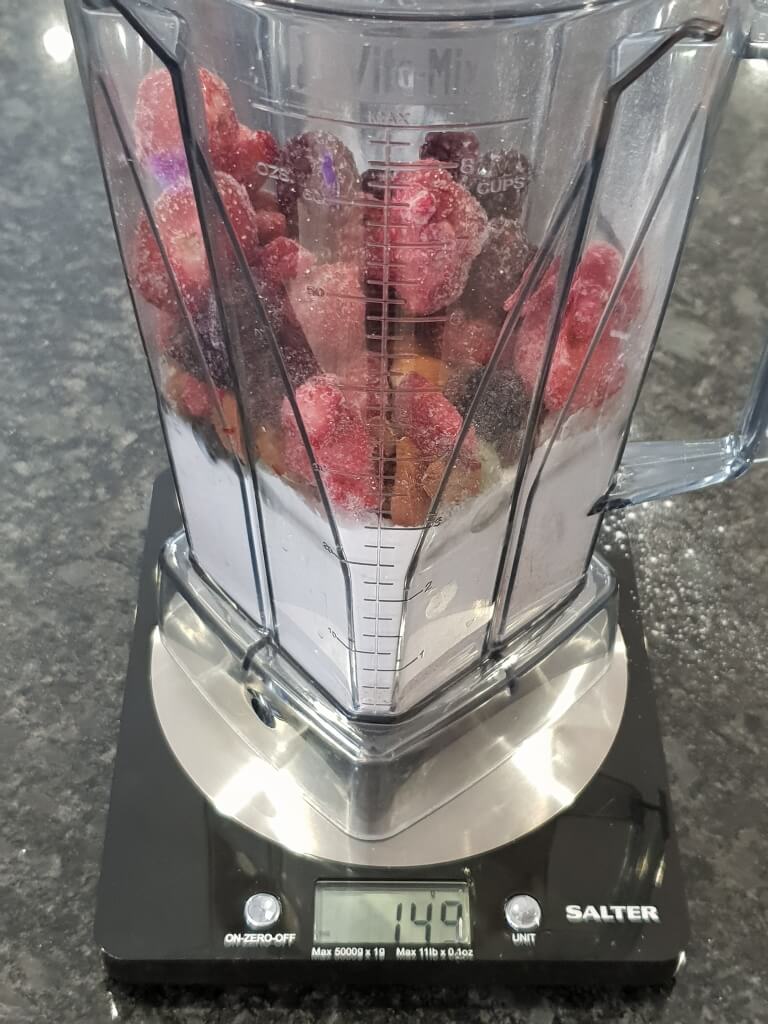
- Water (651g). You could use milk, coconut water or anything you like, but it's probably best to try it with water first. Just chuck in what looks like enough (6-700mls). You'll soon learn what the right amount looks like.

- Blend for thirty seconds or so. If we'd paid attention, ramping up the speed more slowly and not using the high speed setting, we could have stopped it from going so foamy. But life is short and this way was more fun (not necessarily evident from the video).
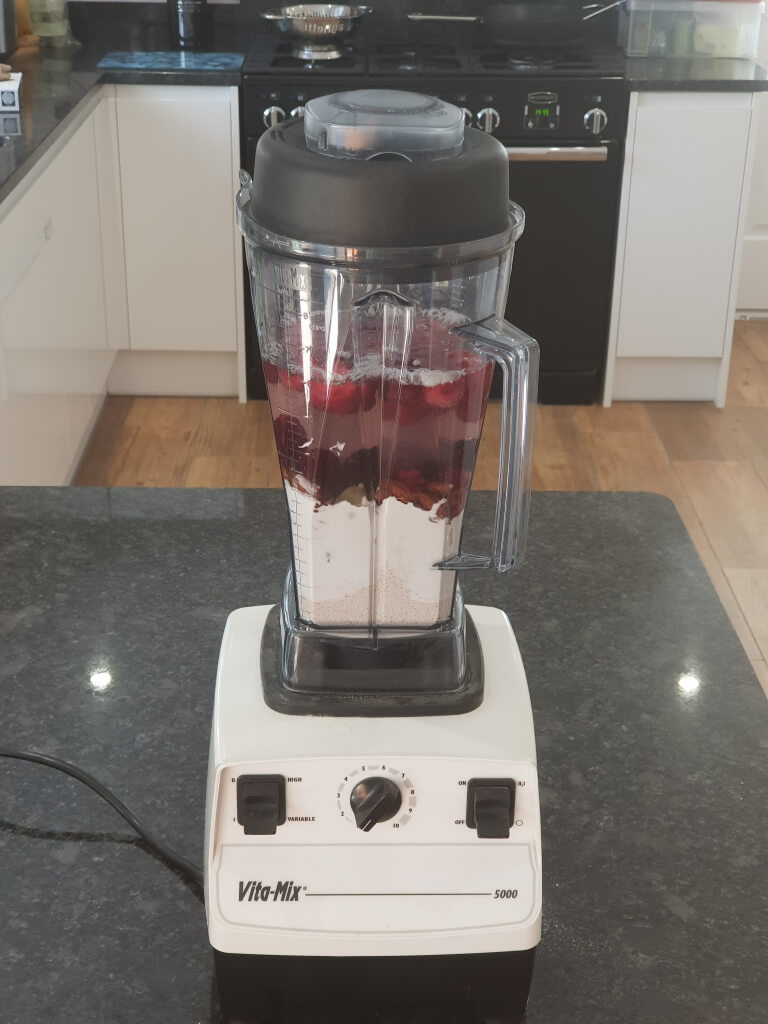
- The finished drink


Note that it's completely fine for my young kids to drink a small quantity of this as a treat, but that it'd be completely insane of me to let them consume 60g of protein in one sitting. Use your common sense.
- Clean up by putting warm water and a little washing up liquid into the blender. Like this.
Nutritional Information
First let's look at the claimed macronutrient profile of the ingredients (either found online or taken from the packaging). Note that the claimed kCal values don't correspond to the claimed quantities of each macronutrient. Measuring the calorific content of food is not an exact science[4].
| g/100g | ||||
| Ingredient | Carbohydrate | Protein | Fat | kCal |
|---|---|---|---|---|
| Oats | 61.1 | 11.0 | 8.1 | 361 |
| Whey Isolate | 0.0 | 97.6 | 0.3 | 374 |
| Banana | 23.0 | 1.1 | 0.3 | 89 |
| Grapes | 17.0 | 0.6 | 0.4 | 67 |
| Almonds | 9.5 | 21.0 | 49.0 | 587 |
| Frozen Fruit | 6.9 | 0.8 | 0.4 | 39 |
| Claimed macronutrient profile of ingredients used | ||||
To determine the actual macronutrient profile for the quantities we used I have recalculated the number of kCal using the classic (but erroneous[5]) values of:
| Macronutrient | kCal per gram |
|---|---|
| Carbohydrate | 4 |
| Protein | 4 |
| Fat | 9 |
| Alcohol (not relevant in this instance) | 7 |
| g | |||||
| Ingredient | Amount | C | P | F | kCal |
|---|---|---|---|---|---|
| Oats | 52 | 31.8 | 5.7 | 4.2 | 188 |
| Whey Isolate | 110 | 0.0 | 107.4 | 0.3 | 432 |
| Banana | 130 | 29.9 | 1.4 | 0.4 | 129 |
| Grapes | 102 | 17.3 | 0.6 | 0.4 | 75 |
| Almonds | 47 | 4.5 | 9.9 | 23.0 | 265 |
| Frozen Fruit | 149 | 10.3 | 1.2 | 0.6 | 51 |
| Water | 651 | 0 | 0 | 0 | 0 |
| Totals | 1241 (590) | 93.8 | 126.2 | 29.0 | 1140 |
| Actual macronutrient profile for the ingredients and quantities used | |||||
As you can see, the almonds are very dense in calories (hence the red number) and the frozen fruit is the opposite (hence my colouring it green). Thus, if you want to reduce your calories, you could swap almonds for frozen fruit. This is obvious stuff, you don't need me to point it out.
If you halve the drink we made, you end up with two drinks, each containing:
| Macronutrient | g | kCal | % total kCal |
|---|---|---|---|
| Carbohydrate | 46.9 | 188 | 32.9 |
| Protein | 63.1 | 252 | 44.2 |
| Fat | 14.5 | 131 | 22.9 |
| Totals | 570 | 100 |
As previously mentioned, this stuff lacks precision, so it might be safer to say it looks like being roughly 45-50g Carbs, 60-65g Protein, 15g Fat. Thus the percentages of each macronutrient by kCal are of the order of:
30-35% Carbohydrate : 40-45% Protein : 20-25% Fat.
I'm pretty happy with that and, if I wasn't, I could easily tweak the recipe without spoiling the flavour too much. And I could split it into three or four drinks as described in the introduction.
A few observations
- Use frozen fruit or add some ice, otherwise the resultant drink can be disconcertingly warm;
- If you're trying to gain weight, use milk instead of water, but remember to account for it's protein content;
- If you're really trying to gain weight, add some peanut butter (assuming you don't have a nut allergy);
- If you don't like almonds, try other nuts (again, assuming you don't have a nut allergy);
- Coconut oil is nice (with the right fruits, it's amazing), but don't overdo it;
- Cocoa powder can be great, but you only need a tiny amount (~½ teaspoonful);
- Olive oil may not be as horrendous as you imagine;
Conclusion
I hope this has given you some ideas of how to make your own nutritious fruit smoothies. Don't be afraid to experiment. And, if you've got children, get them involved; it's good fun and they tend to love that sort of thing.
If you come up with a good recipe, let me know. I'll be posting more recipes made by me and the kids as we discover them.
Finally, if you want to buy your unflavoured whey protein powder from BulkPowders (the same supplier I use), you can use my affiliate link to get 25% off your first order[*].
Actually, it was in September. I just didn't write it up until now. ↩︎
This is, perhaps, of little consequence in the grand scheme of things. ↩︎
According to Wikipedia, the word tare originates from the Middle French word tare "wastage in goods, deficiency, imperfection" (15th c.), from Italian tara, from Arabic طرح ṭarḥ, lit. "thing deducted or rejected", from taraha "to reject". So now you know. ↩︎
In fact, it's extremely imprecise. I might write a bit more about it later ↩︎
There are various reasons for this being wrong, including the fact that everybody is different, adjustments can be made for fibre content, etc. It's a good rule of thumb, though. ↩︎


